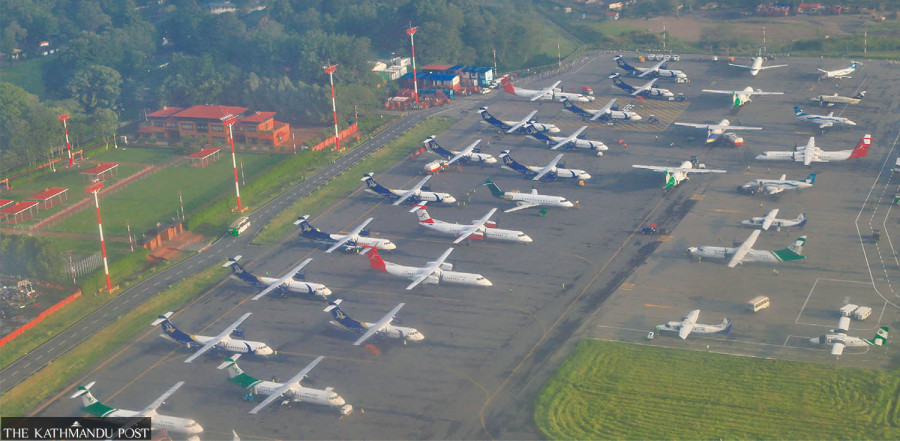Money
House committee directs prime minister to table civil aviation bills in Parliament at earliest
On August 2, 2021, the upper house unanimously passed two aviation bills, which had been languishing for a year and a half.
Sangam Prasain
The parliamentary International Relations and Tourism Committee has directed Prime Minister Pushpa Kamal Dahal to table the civil aviation bills in the lower house of the federal parliament at the earliest.
“The bills have been languishing for a long time. As we doubt the Civil Aviation Ministry will table them in Parliament, we have directed the Prime Minister's Office to do it,” said Raj Kishore Yadav, chairman of the committee. “We have also directed the civil aviation ministry and the Nepal government to the same.”
The directives were issued on Wednesday.
The two long-pending aviation bills—the Civil Aviation Authority of Nepal Bill, and the Air Service Authority of Nepal Bill—envisage splitting Nepal’s aviation body into two entities—service provider and regulator, a condition for Nepal to be struck off the air safety list.
The parliamentary committee has also directed the civil aviation ministry to make a roadmap for the removal of Nepali airlines from the ‘Air Safety List’ of the European Union and inform the committee about its progress.
In July, two months before the European Union Aviation Safety Agency planned a safety audit of Nepal’s aviation system, the civil aviation ministry sent the draft bills to the Cabinet, seeking its ‘approval in principle’ for tabling it in Parliament.
The message was clear. Passing the civil aviation bills would ensure an independent regulator and pull Nepal out of the air safety list, which has caused immense damage to Nepal’s tourism and earned the country the reputation of being a country with a terrible aviation safety record.
The draft bills, already passed by the upper house and dropped by the lower house following a change in government, were abruptly halted by the Pushpa Kamal Dahal administration.
“We know that the bills are deliberately not being forwarded to Parliament. To pass it is now our committee’s top priority,” said Yadav.
Multiple sources the Post talked to say that the bill’s passage was stopped by Pradip Adhikari, director general of the Civil Aviation Authority of Nepal after he assured the prime minister and other political leaders that the European Commission (EC), part of the European Union executive, would lift the ban this time.
Adhikari’s assurance has come to naught.
On November 30, the EC decided to continue its ban on Nepali airlines through an updated “EU Air Safety List,” the list of non-European airlines that do not meet international safety standards and are therefore subject to an operating ban or operational restrictions within the European Union.
Following the continuation of the ban, the Civil Aviation Authority of Nepal, which currently performs a dual role—service provider and regulator—blamed Nepal Airlines that its poor safety management had led to Nepal being in the EC’s bad books.
For a long time—over 15 years—global aviation watchdogs have questioned the civil aviation body’s dual role and urged Nepal to split the organisation into two entities to enhance the safety of flyers.
However, the government has shown no interest in doing so, and Nepal's aviation industry is suffering as a result.
“In the second innings [of the bills] too, we made a lot of effort to table the bills in the Cabinet. The Finance Ministry sat on them for three months when they were sent for comments. Then, for another three months, the same happened with the law ministry,” a source familiar with the matter at the Tourism Ministry told the Post.
“After getting nods from the Law and Finance ministries, the draft bills landed at the prime minister’s office. And they are still there.”
“The prime minister has not asked the chief secretary to table the bills [in the Cabinet].”
Sanjiv Gautam, former director general of the Civil Aviation Authority of Nepal, told the Post in a recent interview. He said the prime minister should be held accountable this time as it was him who blocked the bills.
On August 2, 2021, the upper house unanimously passed the two aviation bills which had been languishing for a year and a half as political squabbling engulfed the country. They were registered on February 23, 2020.
The bills then went to the Parliament Secretariat which included them on the agenda of a meeting of the lower house scheduled for March 2, 2022.
But on the day the bills were supposed to be discussed, the then Tourism Minister Prem Bahadur Ale asked the Parliament Secretariat to hold them back, explaining that some employees of the aviation regulator were opposed to the planned fragmentation of their organisation.
Two weeks later, on March 15, the then President Bidya Bhandari prorogued the federal parliament. As a result, the bills went into deep storage.
The bills were returned to the Civil Aviation Ministry when the second federal parliament of Nepal was elected by the 2022 general elections on November 20, 2022.




 18.12°C Kathmandu
18.12°C Kathmandu













